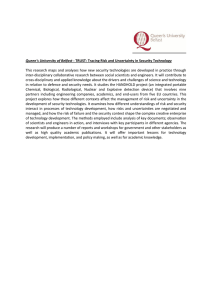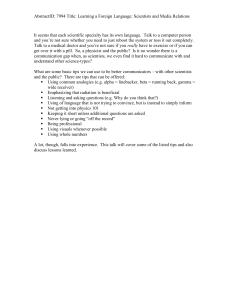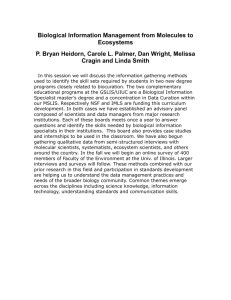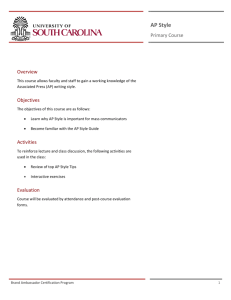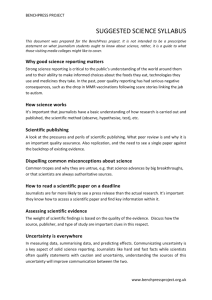Presentation slides - Haddad
advertisement
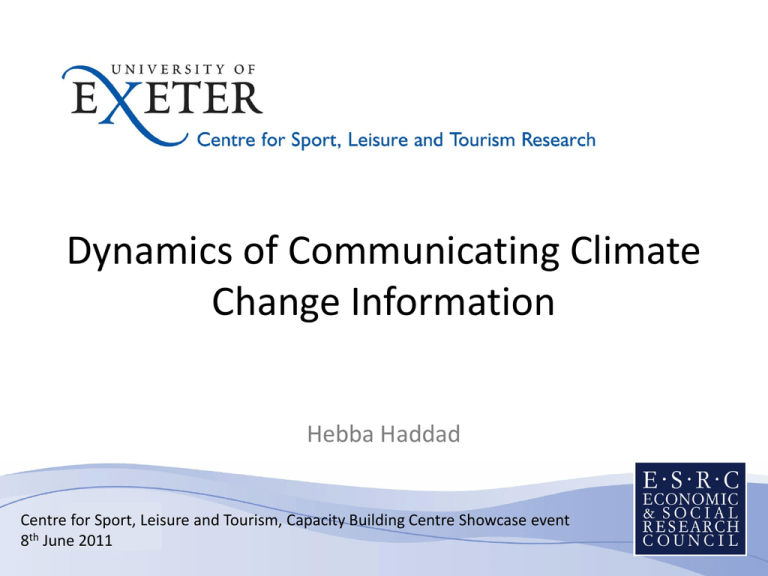
Dynamics of Communicating Climate Change Information Hebba Haddad Centre for Sport, Leisure and Tourism, Capacity Building Centre Showcase event 8th June 2011 Dynamics of Communicating Climate Change Information • Started October 2009 • SLT CBC Cluster themes – Travel, transport and sustainability – Environment and Landscape • Supervision team University of Exeter, School of Psychology – Dr Anna Rabinovich and Dr Thomas Morton • Met Office contact points – Sarah Tempest, Andy Yeatman (Met Office, Communications) – Dr Debbie Hemming (Met Office Hadley Centre) PhD Aims • Managing uncertainty is the critical challenge to climate change communication: – Aim to critically examine the role of the informer, information and informed in the communication of climate change information • Investigate how scientists and science communicators approach uncertainty and the process of communication itself • Investigate how audiences respond to climate change communications as a function of message content and their own motivations • Examine this in the context of sustainable behaviour Mixed-Methodology PHASE ONE Qualitative Interviews Aim: To get a better understanding of the role of scientists and climate science communicators in process of (public) communication of climate science PHASE TWO Quantitative surveys Aim: Pilot and test themes from Phase One Two studies amongst publics Interviews with climate scientists and climate science communicators PHASE THREE Qualitative? Quantitative? Aim: Build on previous two Phases Questionnaires? Interviews? Focus groups? Experimental work? Indicative findings Qualitative interviews • Semi-structured interviews with 14 participants (9 scientists, 5 Communicators) • Agreement that key role is to inform rather than influence behaviour change • Climate scientists and climate science communicators work on different communication models – Scientists focus on an ‘informational’ (deficit) model – Communicators focus on a more ‘relational’ model • Perceived barriers to communication with publics – Scientists need to communicate uncertainties and jargon (Comms) – Audience’s lack of understanding of science (Scientists) Indicative findings Experimental study • 152 Exeter students were presented with a website for scientific organisation. Varied: – Uncertainty in climate change predictions (lower versus higher) – Presentational style (open versus corporate) • Measured perceptions of the organisation (e.g., trustworthiness); willingness to engage with the message; behavioural intentions Indicative findings Experimental study • Presentational style influenced perceived trustworthiness – Open style conveyed higher trust/ honesty/ morality • Presentational style modified the effects of uncertainty on engagement and behaviour: When uncertainty is high, an open communication style facilitates action (and engagement) (Preliminary) Implications • Scientists and communicators approach communication differently: – Scientists focus on informational aspects – Communicators focus on relational aspect • Relational processes shape how audiences respond to informational content of climate change messages – i.e. the two interact • Addressing the barrier of uncertainty may not always involve resolving uncertainty itself: – Understanding communication processes and how these shape audience motivations is key Thank you for listening • Research presented here was conducted during an ESRC Studentship under its Capacity Building Clusters Award (RES-187-24-0002) in partnership with the Met Office • For more information about this project and the work of the Centre for Sport, Leisure and Tourism research, see www.exeter.ac.uk/slt/ourresearch/communicatingclimatechange • Hebba Haddad, H.Haddad@exeter.ac.uk
